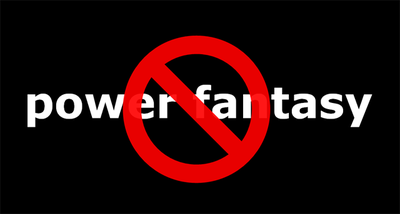m |
m |
||
| (2 intermediate revisions by the same user not shown) | |||
| Line 1: | Line 1: | ||
Power fantasy is the thing we do best in games. We excel at giving | Power fantasy is the thing we do best in games. We excel at giving players a feeling of power over their surroundings, at letting them feel the satisfaction of starting out weak and becoming invincible<ref>Nicole Lazzaro writes about [http://xeodesign.com/xeodesign_whyweplaygames.pdf this stuff] a lot. She uses the term Fiero in this context.</ref>, until they are the kings of the world, the rulers the universe, they have vanquished evil, saved the girl, and finally gotten to that really high ledge by exploding a rocket at their feet. | ||
However, I think power fantasy is pretty cheap, and we need to eschew it and find better, deeper, more meaningful ways to entertain and compel players. | However, I think power fantasy is pretty cheap, and we need to eschew it<ref>Let me be more clear: I think power fantasy is a useful tool as a designer, and I enjoy experiencing it as a player, and I don't think it's going away. However, I think we already do it pretty damned well. We need to work on the other stuff, and some short-term overcorrection would not hurt...less power fantasy for a while, more exploration of other emotional tools. Let's call it ''Affirmative Action for Interactive Emotional Tools''.</ref> and find better, deeper, more meaningful ways to entertain and compel players. | ||
The New Yorker<ref>I think it was the October, 2003 issue.</ref> had a David Denby review of the film, ''Seabiscuit''. As usual, Denby writes a pretty good review. But one sentence stuck with me: | The New Yorker<ref>I think it was the October, 2003 issue.</ref> had a David Denby review of the film, ''Seabiscuit''. As usual, Denby writes a pretty good review. But one sentence stuck with me: | ||
| Line 10: | Line 10: | ||
I think he's totally right about pathos, and it's also exactly how I feel about power fantasy in games. Every time we use it, we fail a test of honor and miss a chance to explore new emotional territory. | I think he's totally right about pathos, and it's also exactly how I feel about power fantasy in games. Every time we use it, we fail a test of honor and miss a chance to explore new emotional territory. | ||
<center>[[Image:powerfantasy.png|400px]]</center> | |||
<references/> | <references/> | ||
Latest revision as of 04:11, 2 January 2008
Power fantasy is the thing we do best in games. We excel at giving players a feeling of power over their surroundings, at letting them feel the satisfaction of starting out weak and becoming invincible[1], until they are the kings of the world, the rulers the universe, they have vanquished evil, saved the girl, and finally gotten to that really high ledge by exploding a rocket at their feet.
However, I think power fantasy is pretty cheap, and we need to eschew it[2] and find better, deeper, more meaningful ways to entertain and compel players.
The New Yorker[3] had a David Denby review of the film, Seabiscuit. As usual, Denby writes a pretty good review. But one sentence stuck with me:
When a director exploits our hard-wired responses to pathos, he fails, so to speak, a test of honor.
I think he's totally right about pathos, and it's also exactly how I feel about power fantasy in games. Every time we use it, we fail a test of honor and miss a chance to explore new emotional territory.

- ↑ Nicole Lazzaro writes about this stuff a lot. She uses the term Fiero in this context.
- ↑ Let me be more clear: I think power fantasy is a useful tool as a designer, and I enjoy experiencing it as a player, and I don't think it's going away. However, I think we already do it pretty damned well. We need to work on the other stuff, and some short-term overcorrection would not hurt...less power fantasy for a while, more exploration of other emotional tools. Let's call it Affirmative Action for Interactive Emotional Tools.
- ↑ I think it was the October, 2003 issue.



